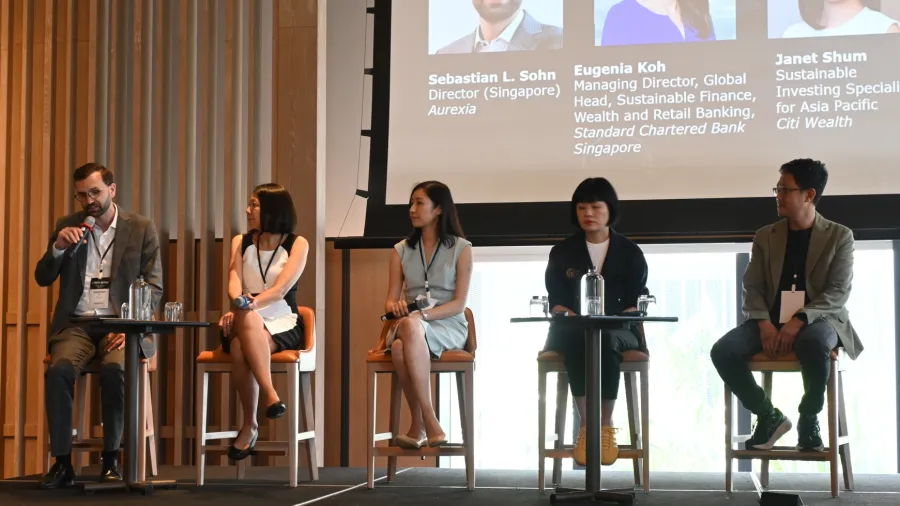
What two challenges impede the finance sector’s ESG goals?
Industry experts agreed that the sector must aim for objectives that extend beyond immediate business interests.
The global push for sustainability has always been a staple in the finance sector, yet, industry experts named two challenges: greenwashing and the impact of climate change.
In the Asian Banking and Finance and Insurance Asia summit held last 3 September at the Andaz, Singapore, moderator Sebastian L. Sohn, director (Singapore) of Aurexia, emphasised the importance of a front-to-back approach to environmental, social, and governance (ESG). The summit gathered a total of 242 attendees from various markets.
For institutions like Standard Chartered Bank Singapore, Eugenia Koh, managing director, global head of Sustainable Finance, Wealth and Retail Banking, provided insights into how her organisation integrates ESG principles across both products and processes.
“On the product side, we ensure we have sustainable variants across our different product groups,” she said, citing examples such as green mortgages and zero-interest deposits across multiple markets.
This effort underscores the importance of providing consumers with options that align with their sustainability goals without compromising financial returns. Kuh also highlighted how their process side works in conjunction with various internal teams, including the CIO office, to embed ESG considerations into their investment processes.
Citi Wealth takes a similar approach, according to Janet Shum, Sustainable Investing specialist for Asia Pacific (APAC).
She explained that sustainability needs to be a core component of several functions—from thought leadership to internal education, client engagement, and product development.
“We try to bring new innovative products to our clients. We partner with various asset managers and development banks to create financial solutions that address social and environmental issues whilst offering competitive risk-adjusted returns,”
Schum shared. Such innovations are crucial as clients increasingly demand transparency and accountability from their investments, especially in the wake of rising concerns about greenwashing.
Addressing greenwashing and enhancing transparency
Both Schum and Kuh stressed that the financial industry must take misleading claims about the sustainability of products seriously.
Citi Wealth has implemented a “sustainable investing standard” to ensure all products labelled as sustainable meet stringent criteria. This includes a rigorous due diligence process designed to evaluate both the product and the manager overseeing it.
Kuh noted the challenge posed by the evolving landscape of sustainable finance, stating, “It’s challenging for people to navigate this space, and we’re going through a transition phase. But the good news is that we’ve identified the risks and loopholes, and this is helping drive more transparency and credibility in the industry”.
The complexity of sustainable finance, with its new regulations, taxonomies, and product labelling, means that investors are becoming more selective. They demand higher levels of transparency in investment processes and are increasingly looking for managers who actively engage with portfolio companies to improve their sustainability performance. This shift signals a maturation of the sustainable finance market, where long-term value creation and ethical considerations are no longer at odds.
The role of insurance in climate resilience
Vy Pham, Regional Platform Product owner, APAC, Zurich Insurance, elaborated on the impact of climate change.
“As an insurer, climate impacts are extremely important to us. I’m from Australia where we’ve experienced severe climate events like flooding and fires. These events are making insurance more expensive, and some customers can’t afford to insure their homes anymore,” she said.
Zurich is proactively working with commercial clients through its resilience services, helping them assess climate risks and adapt accordingly.
Additionally, Zurich collaborates with governments in countries like Australia and Malaysia to build more resilient infrastructure and avoid high-risk areas like floodplains.
Vy further highlighted Zurich's efforts to provide sustainable options for customers without extra costs. One example is their partnership with Tesla to offer insurance specifically tailored for electric vehicle (EV) owners.
The future of sustainability in financial services
Looking forward, panellists agreed that financial services must aim for objectives that extend beyond immediate business interests.
Kuh observed that successful conversations about sustainability happen when it’s integrated into business outcomes. She said, “Sometimes there’s a false dichotomy between sustainability and business outcomes. The most successful conversations happen when we bring the two together”.
By aligning sustainability goals with broader business objectives, financial institutions can unlock new opportunities, such as exploring sustainable uses of land or generating renewable energy.
Schum highlighted the critical role banks play in facilitating the flow of capital into sustainable development. Citing United Nations estimates, she mentioned that $4.2t is needed annually to meet the Sustainable Development Goals (SDGs) by 2030, a figure far beyond what public funding can provide.
Financial institutions, therefore, are uniquely positioned to bridge this gap, particularly by helping business leaders and philanthropists expand their sustainability-focused investments.
As the session concluded, Simon Goh, head of Digital Experience Studio, Great Eastern, mentioned that he would focus on innovating insurance products to incentivize policyholders to make sustainable choices.
Meanwhile, Vy hoped for greater technological integration, such as using AI to anticipate climate impacts, thus allowing insurers to develop proactive solutions.



















 Advertise
Advertise





